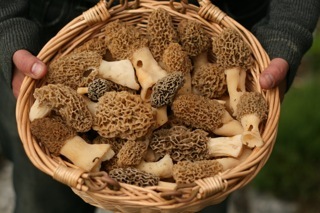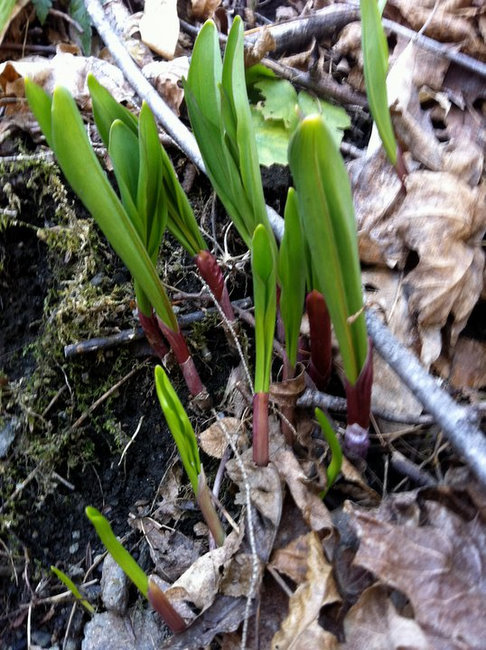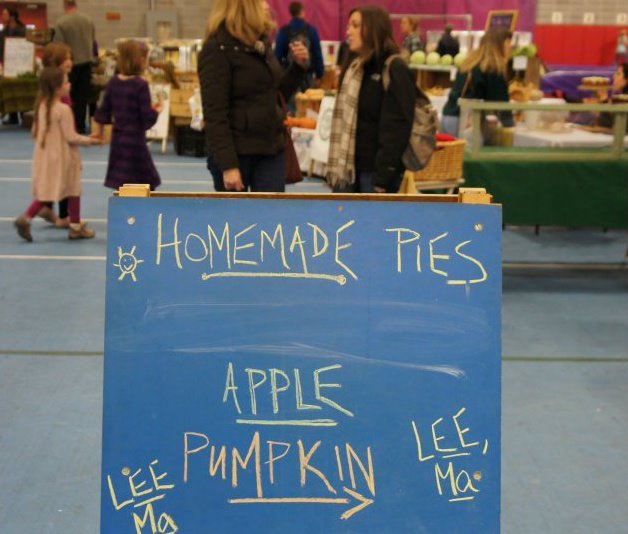| Home | About | Archives | RSS Feed |

Area Restaurants & Farmers Go Into the Wild

Courtesy photo
Morels are one of the many wild edibles found in the Berkshires. |
GREAT BARRINGTON, Mass. — Mud is not the only springtime element running in abundance in Berkshire County; April and May also mark the beginning of wild edibles season.
Many area restaurants, foragers and farmers are taking advantage of nature's bounty, as both a means to educate and to feed a growing number of foodies and locavores.
Ted Dobson, owner of Equinox Farm in Sheffield and co-founder (along with Laura Meister of Farm Girl Farm and Anna Mack of Wild and Cultivated) of Wild Leek Week, said shining the spotlight on nature's harvest is the key to encouraging responsible stewardship and eating well.
"There's a lot more appreciation in general for what grows in the wild," he said in a phone interview. "The whole eating locally and organic farming movement has really encouraged this kind of event. It's very tantalizing because they [ramps, fiddleheads, morels and other wild edibles] only come in season for a few short weeks or a month at most. Wild ancestral breeds always have a flavor that is unadulterated. Culinarily, we are much more attuned to flavor in its native state."
Indeed, the pungent tang of ramps is a draw for many diners and local chefs as is the idea of foraging for food, an activity that Dobson said has long been an integral part of human survival and, more recently, food culture.
"Our history as a species is one of eating from the wild," he said. "In doing so, one needs to be responsible just like with anything else. The idea should be, don't take more than you need. It's common sense. It's important to take a cue from people who are good hunters. They know what role these edibles play in their natural state. We need to be thoughtful, we didn't sow these seeds."
|
Photo by Austin Banach Ramps in the wild. |
Although we didn't sow the seed, the literal fruits of foraging labor are on full display this week at area restaurants, as each pays homage to the ramp with unique recipes, lavish meals and drinks.
Cafe Adam is offering the Dirty Ramp Martini (served with Berkshire Mountain Distillers gin or vodka) and Prince Edward Island mussels with ramps, bacon, green peas and Highlawn Farm cream. In addition to these savory appetizers, Mission Bar and Tapas in Pittsfield is holding a "Rampapalooza" five-course wine dinner on Wednesday, April 20, while the Castle Street Cafe is offering a "Redolent Ramp" three-course dinner on Thursday, April 21.
Other participating restaurants have also jumped aboard the ramp ship including Allium, Old in on the Green in New Marlborough, John Andrews in Egremont and Caffe Pomo D'Oro in West Stockbridge.
Area restaurants are not the only promoters of wild things in the Berkshires. Berkshire Farm & Table, an organization bringing Berkshire food culture to the forefront of the sustainable food movement, will present Where the Wild Things Are, a series of eight wild food walks lead by experienced instructors who will focus on responsible harvesting techniques, recipes and the history of foraging in the Berkshires. The walks will take place on four weekends during the month of May and are presented in partnership with Berkshire Grown’s Farmed and Foraged culinary event May 20-22 and are sponsored by the Williams College Sustainable Food and Agriculture Program. Program manager Katherine Millonzi said the high demand for sustainable, local food sources provides a perfect opportunity to raise awareness about sustainable practices.
"It's a chance for the community to get acquainted with what is growing in their landscape and to become familiar with sustainable practices," she said. "Everything about this is coupled with education. What we are trying to do is strike a balance — raising consciousness about people's diet, never taking out more than you put in. It's rooted in a desire to connect people with the food they eat. Taking something out of the earth and preparing it is one of the most beautiful things we can do as humans."
Not to be outdone, the educational arm of the foraging journey is not the only benefit harvesting in the wild.
"It provides a unique and wonderful gastronomic experience," Millonzi said. "It's using all of the senses, not just your brain and connecting your taste buds with your brain. There's diversity built in."
| Tags: Wild Leek Week, Where the Wild Things Are, foraging |



 Stephanie Farrington of
Stephanie Farrington of